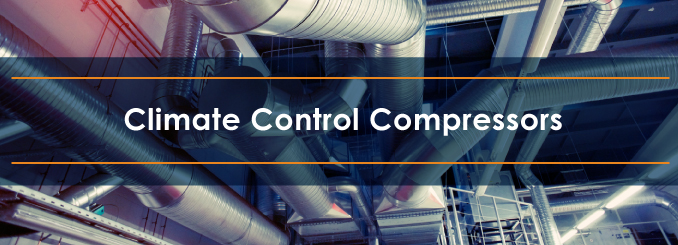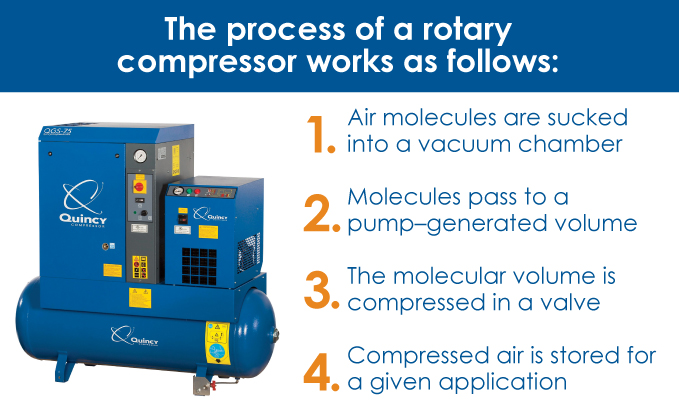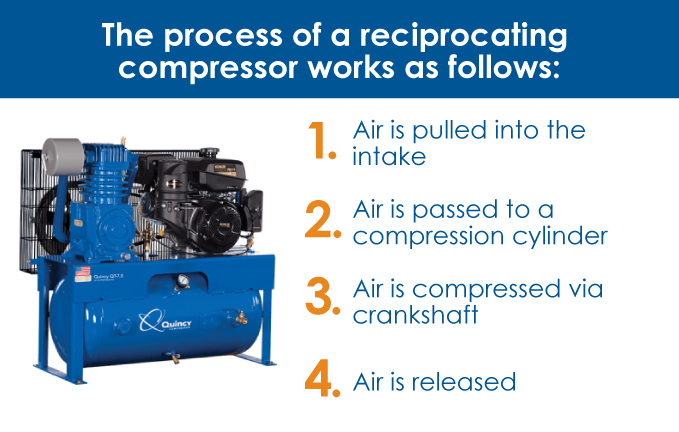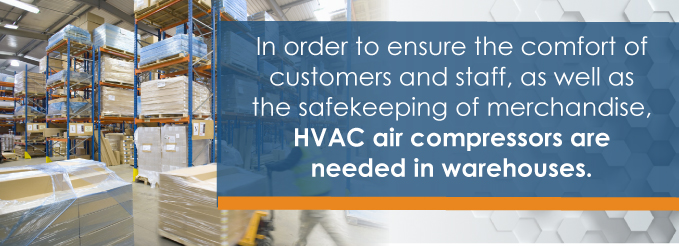
Over the past century, man’s triumph over air has been marked by two inventions: the air compressor and the air conditioner. Both inventions have been integral to the development of HVAC systems, which have made it possible to control temperatures and air quality in buildings both large and small. In recent years, the role of air compressors in climate control has taken on increasing importance as buildings grow larger and outdoor temperatures become more intense.
Contact Us Learn More Find a Dealer Near You

An HVAC air compressor generally comes in one of four categories:
- Rotary compressor – a common type of air compressor for HVAC systems
- Reciprocating compressor – a durable air compressor for climate control systems, this type is often used in split–air conditioners
- Scroll compressor – a more expensive type of HVAC air compressor that is most often seen in higher-end systems
- Variable speed compressor – a newer development among air compressors for HVAC systems, this type is generally among the most expensive, and is generally selected for larger-scale climate-control needs
So how are air compressors used in climate control? While the scope and magnitude can vary according to the size of the system and the capacity of a given compressor, all HVAC air compressors serve the basic purpose of maintaining fresh air and desirable indoor temperatures regardless of the weather outside.
Rotary Compressors
A rotary compressor is designed around a cyclic pump that generates volume on contact with a pressure–lowering chamber. The process of a rotary compressor works as follow:
- air molecules are pulled into a vacuum chamber
- molecules pass to a pump–generated volume
- the molecular volume is compressed in a valve
- compressed air is stored for a given application
A climate-control air compressor of the rotary type is suitable for providing desired air levels in small- and medium-sized spaces, like single or two–story office buildings.
Comfortable indoor air during summer months. For homeowners, apartment tenants and small-business owners, rotary–based HVAC air compressors are reliable for the following benefits during warmer months:
- comfortable indoor air on humid days
- cooler walls, carpets and furnishings
- dryer indoor air at shops and restaurants
With rotary-powered air conditioners, people can stay indoors when outdoor summer temperatures peak and enjoy the days in relative comfort.
Adequate warmth during wintertime. In suburban neighborhoods and inner-city apartment buildings alike, rotary air compressors power smaller HVAC systems, which provide comfort in single- and multiple-room spaces. As such, residents in both settings can reap the following wintertime benefits:
- comfortable indoor air on cold days
- ideal indoor temperatures day and night
- clean air for family gatherings
In small- and moderate-sized homes, rotary-driven HVAC systems are good for keeping households comfortable during the months between November and February.
Economical comfort year-round. With HVAC systems powered by rotary air compressors, people can benefit from the comforts provided by adjustable temperatures throughout the years. The resulting advantages for people using properly set temperatures include:
- reduced monthly energy bills, thanks to the optimal efficiency of climate-control air compressors
- overall budget control – more money spent on recreational activities instead of avoiding uncomfortable household temperatures
- improved health due to vast reductions in exposure to extreme temperatures
Throughout the United States, lives have improved year-round thanks to the comfort provided by modern HVAC systems, and much of that credit goes to the efficiency and affordability of rotary compressor technology.
Reciprocating Compressors
Running on crankshaft–driven pistons, units of this type are among the most commonly used air compressors in climate-control systems of the medium-to-large variety. The process of a reciprocating compressor works as follows:
- air is pulled into the intake
- air is passed to a compression cylinder
- air is compressed via crankshaft
- air is released
Reciprocating compressors are used in everything from general manufacturing plants to HVAC systems.
Adequate manufacturing plant control. In most operations, air levels need to be kept under control at all times to ensure products and machines are protected from harsh temperatures. Additionally, air systems need to keep products safe from airborne elements. In everything from oil refineries to refrigeration plants, the following benefits are gained from reciprocating air compressors:
- sufficient indoor climate control throughout all hours of operation in the summer and winter months
- better-quality products due to improved application processes
- reduced maintenance costs and longer-lasting equipment thanks to the reduced frequency of climate-induced stress on machines and parts
Sufficient office building comfort. Throughout the working week, comfort is a daily necessity. In office buildings large and small, temperatures can make working environments hectic and uncomfortable when there’s no adequate air conditioning or heating. With a reciprocating climate-control air compressor, people who work in office buildings are able to:
- get more work done throughout the day and not feel stressed by extreme outdoor temperatures
- stay cool during the hottest days of the year without having to resort to damp towels and constant cold drink consumption
- enjoy adequate warmth in the winter without the need to overlayer wardrobes
Suitable air adjustment in commercial spaces. In stores and restaurants, it’s necessary to have a climate-control air compressor to maintain a comfortable, sanitary environment. If the natural climate has its way, products can be damaged and foods could easily rot from exposure to inhospitable conditions. With a reciprocating air compressor in the HVAC system, the following benefits are gained at retail outlets and eateries alike:
- heat- or cold-sensitive products are protected from harmful exposure on humid and freezing days
- produce and baking products are spared from spoilage in cooking areas and storage rooms
- customers and patrons enjoy a more comfortable shopping or dining experience
Whether the weather calls for highs in the 90s or lows in the 20s, reciprocating air compressors for HVAC systems make conditions as comfortable as any level-temperature day.
Scroll Compressors
With fewer moving parts than other compressor types, the scroll compressor is a relatively quiet, vibration-free alternative to rotary and reciprocating units. Common in larger HVAC systems, the compressor is designed around a pair of scrolls that pressurize gases and liquids. Scroll compressors boast the following characteristics:
- employs two to two and one-half crankshaft rotations, as opposed to the single rotation of rotary compressors
- doesn’t use a suction or dynamic discharge valve
- almost 100 percent efficient at pumping trapped fluid, unlike reciprocating compressors
In large public spaces that draw thousands of people each day, scroll-type air compressors provide a more favorable set of conditions on humid and freezing days.
HVAC climate control in warehouses. In large distribution centers across the U.S., temperatures can range from 100 F in July to 20 F in December. In order to ensure the comfort of workers, as well as the safekeeping of merchandise, HVAC is needed for the following reasons:
- allow customers to browse aisles for hours on end without perspiring or getting goosebumps
- ensure staff can handle shifts without becoming fatigued by heat
- keep temperature-sensitive products like fluids and electronics fresh and optimal throughout the most extreme weather conditions
Air control in shopping malls. Day after day, shopping malls are inundated with foot traffic. Throughout each shop, department store and concourse wing, the quality of air is dependent on a high-powered HVAC system. In shopping malls throughout North America and abroad, scroll compressors allow for the following conditions at shopping malls:
- comfortable, perspiration-free browsing and buying from shop to shop
- ideal, even-temperature working conditions for sales clerks and inventory staff
- well-maintained products that are spared from exposure to heat or moisture
In shops that sell carpeting and apparel, HVAC air systems stop the spread of moisture by sucking water particulates from the air.
Suitable temperature adjustments in food courts. One of the most vital functions of air compressors in climate control is played out in eating areas, where the air must be pure and of sound temperature to ensure the quality of food and comfort of diners. At food courts, scroll-powered climate-control air compressors keep the following conditions in order:
- good-quality food products that won’t dry out, rot or spoil in a matter of hours
- comfortable eating areas that are neither too hot, cold or moisture-ridden
- fresh, circulated, odor-free air for a suitable dining experience
Variable Speed Compressors
The most energy-efficient of air compressors, the variable-speed type employs a special drive that adjusts the rotation speed according to the needs of a given application. Key benefits of the variable-speed air compressor for HVAC systems include:
- reduced energy costs
- reduced likelihood of power surges
- more consistent pressure delivery
When buildings are able to lower their energy costs, the savings gets passed on to tenants and even customers. Additionally, buildings end up with more money to invest in other areas, such as renovations, expansions and improvements to pre-existing rooms, hallways, lighting and other features. In the largest of places where people congregate, variable-speed air compressors provide exponential climate-control benefits.
Optimal HVAC systems in skyscrapers. In buildings that are upwards of 20 to 30 stories or more, large HVAC systems are needed to ensure ideal temperatures are maintained on each floor. After all, without air conditioning, buildings get hotter the higher up you go. With a large, centralized system of variable-speed compressors in place for indoor climate control, the following conditions can be maintained inside the tallest buildings:
- comfort on every floor, even on the 90th story of a building with full-wall windows that face the sun
- fresh air that’s well circulated at every level, from the sub-basement to the top floor
- safe, moisture-free air that prevents the spoilage of plants and paintings on high floors
Climate control in airports. For most passengers, stepping out from an airplane marks a moment of relief. Part of that experience is breathing the fresh air of an airport concourse, which is made possible with high-powered HVAC systems. Variable-speed air compressors are capable or working the following wonders at airports:
- clean air throughout each airport concourse, regardless of crowding
- comfortable temperatures in each terminal, regardless of whether a given set of windows face the sun on a hot day
- ideal indoor climate conditions for food, snacks and souvenirs
Furthermore, compressor-powered HVAC air systems allow airport passengers to carry numerous forms of luggage without the risk of spoilage due to inhospitable indoor climate conditions.
Fresh air in stadiums. No place gets more crowded than a stadium, where thousands of people assemble to sit in rows across dozens of seating levels. Regardless of the temperature outdoors, the only thing that makes things bearable for those indoors is a high-powered HVAC climate-control system, which allows stadiums to maintain the following conditions:
- fresh air for tens of thousands of people huddled side by side across rows of tight seating
- comfortable temperatures for everyone indoors, regardless of outdoor humidity or cold
- clean air that’s free of oil or moisture, which is vital for large crowds of people, as well as for the quality of food and refreshments
In large stadiums, outdoor humidity is not the greatest threat, since more intense levels of heat can easily be generated by throngs of sardine-packed bodies. With climate-control air compressor systems in place, stadiums are able to keep circumstances under control for the greater comfort of all who attend concerts and sporting events.
Quincy: A Leading Supplier of Climate-Control Air Compressors
Since the Roaring Twenties, Quincy Compressor has been among the world’s leading manufacturers of air compressors of various types. In terms of product innovation and customer satisfaction, Quincy operates throughout nearly a century of experience engineering solutions for companies large and small throughout the United States and beyond. Companies in the commercial and industrial sector respect Quincy as a provider of air compressors for HVAC systems of all sizes.
In the decades since the introduction of air conditioners, Quincy has led the way in the incorporation of compressed-air technology into HVAC climate-control systems for homes and large commercial spaces – including many universities. Today, the capabilities of climate-control compressors have developed to the point that air quality can be maintained and optimized in the most massive indoor spaces. To learn more about the benefits you could get from an air compressor for HVAC, visit our sales and service locator page.




